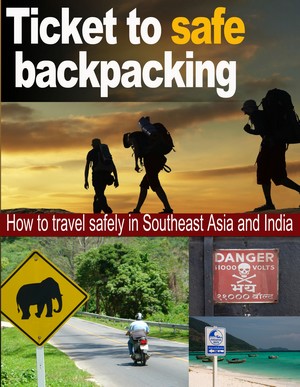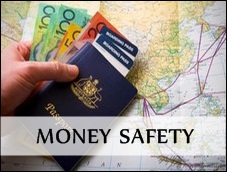On Arrival:
Culture Shock Guide

Culture shock is not easy, and never will be.
So, why do we get culture shocks?
The way I look at it; it's part of human behavior.
We're born and used to the surroundings at home. It's comfortable because you already know those surroundings in and out. But when you arrive to a new country, you're not in our old surroundings anymore.
That makes most of us uncomfortable and disoriented.
I'll give you an example!

I traveled to Mumbai and took a taxi from the airport to town. When I stepped out of the taxi, I walked down the road to find a guesthouse.
I felt suddenly paralyzed by what I saw:
A man peeing next to a small shop in a packed street, in the middle of the day. He seemed to be pretty comfortable with it.
Then I finally found a guesthouse... with goats standing in my way.
And when I finally got to the reception, there were four Indian men staring at me... constantly. They were so obvious and focused. I felt really uncomfortable about it because I didn't know what the h*** was wrong with these people!
This day was awkward to me because:
A) We're brought up by our parents to NOT stare at people
B) We're brought up to pee in a toilet, not in the streets (unless you're drunk and have to do an emergency leak) and...
C) goats belong to farms, not in the big cities in front of the guesthouses..
But with time I got used to the staring, peeing and goats. I was told that staring is something every Indian man does, for no reason. So, differences are neither bad or good, just different. It's just the way it is.
So, we can't fight the cultural differences even if they collide with our cultural values, so why bother..?
First of all:
- Keep an open mind.
You should expect
that a lot will differ from what you`re accustomed to: the climate,
noise, smell, visible poverty, new customs, people's behavior towards
foreigners etc.
It's another
world out there, and it's huge. So, be easy on yourself and take one day at a time.
- Don't panic! Culture shock is normal when
you're in new surroundings.
- Get a lot of rest, and shake off the jet lag the first days/weeks. You're more prepared to meet the new surroundings when you've had your rest. And you can think straight. If you're tired, you'll likely be cranky. And if you're cranky, you get easily provoked (even by minor things). And if you get provoked, you get angry. Showing anger is not accepted in Asia. On top of that, anger will likely cause more problems.
- Learn the basic local phrases for "Hello" and "Thank you". It's good practice and you'll probably feel less foreign.
- Learn local customs. Do some research prior departure. You don't want to offend someone on your first day. That's one less thing to worry about. Example: Don't touch anyone's head in Buddhist countries (like Thailand). That's the sacred part of the body.
Culture Shock Guide:
Return to top of Culture Shock Guide
- Find food you're used to the first days, if you want a smoother transition (like, if you're from Italy, try to find Italian food). You don't need to eat, for instance fried noodles or funky desserts right away!
- Know your location on the map, and make notes of important locations in case you get lost. This will help you feel more secure.
- Talk to the staff at the guest house, and ask how much things cost, like a taxi or Tuk-Tuk fare. By doing this you might prevent scams, anger and a headache. You don't need that the first weeks.
But if you still get scammed, don't be hard on yourself. It's a cliche saying this, but one must fail to learn.
Need more tips?
This article is a taste of what you can expect in my eBook "Ticket to Safe Backpacking." In this eBook, you'll find common safety and health issues, how to avoid scams while backpacking and much more. |
|
Further reading: |
Like this page?
|
Return to top of Culture Shock Guide
Follow This Site
Search this site
Most popular articles
» Travel Forum: Itineraries
» Travel Insurance
» Nightlife in Kuala Lumpur
» Route Planner
» Packing List
» Life After Backpacking
» Kuala Lumpur Malaysia
» Perhentians Malaysia
» Review of massage in Kerala
» Review of Erawan waterfalls/
Connect with us













Comment this page:
Have your say about what you just read! Leave me a comment in the box below.